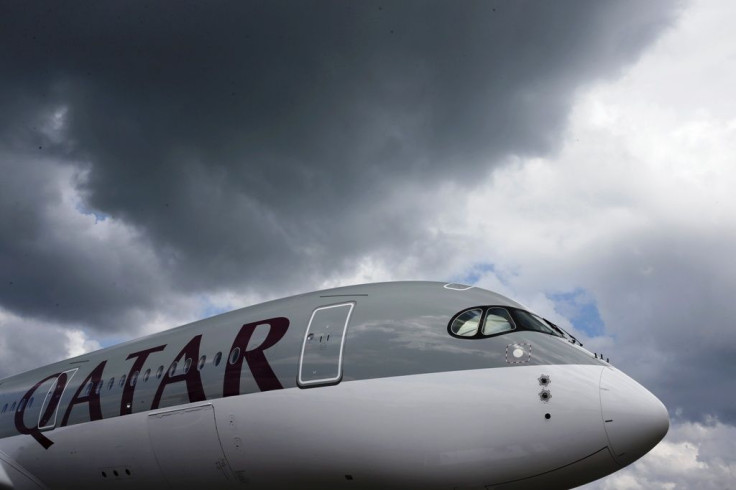Qatar Crisis Explained: What You Need To Know About Tensions In The Gulf

Decades-long tension simmering between Qatar and its Persian Gulf neighbors — Bahrain, Saudi Arabia, the United Arab Emirates — became a major crisis in the Middle East after an alleged fake news report run by Qatar’s state-run news agency May 23 supported Iran and a U.S.-designated terrorist organization.
The report by Qatar News Agency, which Doha maintains was false, attributed some statements to the gas-rich country’s Emir Sheikh Tamim bin Hamad Al Thani. In these statements, the emir called Palestinian militant group Hamas "the legitimate representative of the Palestinian people" and said that the country had “strong relations” with Iran — a Shia-majority country and a bitter rival of other Gulf nations, particularly Sunni-majority Saudi Arabia.
Read: Russia Planted Fake News About Qatar, Probably To Divide US, Allies: Report
"Iran represents a regional and Islamic power that cannot be ignored and it is unwise to face up against it," the emir was quoted as saying in the report. "It is a big power in the stabilization of the region."
The report was widely publicized in other Arab countries. Despite Qatar saying the news piece was fake and that the emir made no such statements, tensions deepened between Doha and its neighbors, who announced the cutting off of diplomatic ties with the country. A June 7 report by CNN said intelligence collected by FBI investigators indicated Russian hackers planted the fake news attributing false statements to the emir. Qatar continued to maintain it was a victim of hacking.
As of June 9, a total of nine countries have cut diplomatic ties with Qatar. These nations are Bahrain, Comoros, Egypt, the Maldives, Mauritania, Saudi Arabia, the UAE, Yemen and the U.N.-backed government of Libya. Four countries — Djibouti, Jordan, Senegal and Chad — have downgraded their relations with the Arab country.
For long, Qatar has followed an ambitious foreign policy and different priorities compared to its neighbors. Two things that bothered neighbors the most were Doha’s support to the Muslim Brotherhood — seen as a terrorist group by some Arab countries, including Saudi Arabia and Egypt, but not by the U.S. — and its closeness to Tehran.
The Brotherhood, according to its website, believes in “democracy that acknowledges political pluralism, the peaceful rotation of power.” This is in direct opposition to hereditary rule in Gulf monarchies and is one of the reasons why the group is considered a threat.
Egypt, which has a semi-presidential system of government, also considers the Brotherhood dangerous. In 2011, during the Arab Spring, Qatar backed the group and the people protesting against then-President Hosni Mubarak, who was in power for nearly three decades. He was forced to resign in February 2011. However, Riyadh supported Mubarak and currently backs President Abdel Fattah el-Sisi, a former military leader.
Read: Qatar Airways Grounds Flights After Diplomatic Concerns Over Fake News, Terrorism
Apart from this, Doha-based news outlet Al Jazeera has been criticized by several Middle Eastern countries. In 2000, Bahrain banned the network’s broadcast after it called municipal elections in the country as “serving Zionism.” A number of Al Jazeera’s journalists were detained in Egypt during the 2011 Egypt uprising for being supportive to the Brotherhood and its leader Mohammed Morsi, the country’s first democratically elected president. Morsi assumed office June 2012 but was ousted by then-Gen. Sisi in a military coup in July 2013.
Several Arab countries have accused Qatar of sponsoring terrorism, including al Qaeda’s Syrian affiliate Nusra Front, Afghan terror group Taliban, and Hamas. However, even Saudi Arabia has been accused of financing Nusra Front.
Qatar also sent its troops to fight against militias, allegedly backed by Iran, in the ongoing civil war in Yemen. Iran and a Saudi-led coalition that includes Qatar support different sides in the civil war.
However, Doha also has good diplomatic relations with Iran and the two countries share ownership of South Pars/North Dome Gas-Condensate field, the world’s biggest natural gas field. Qatar used the field to become the world’s largest exporter of liquefied natural gas (LNG), and the country shares gas wealth and an amicable relationship with Iran.
Qatar, a member of the Gulf Cooperation Council, has had a difficult time maintaining good relations with other GCC countries, which do not support Iran. Unlike members such as Saudi Arabia and the UAE, Qatar does not criticize Tehran for its foreign policies.
It remains unclear when Qatar will be out of the ongoing crisis that could lead to food and water shortages in the country, due to a blockade imposed by its neighbors, which the country called a “collective punishment.” The immediate effect of the crisis was on the country's air travel, which came to a halt after the Gulf neighbors decided not fly their airlines to Qatar. The state airline Qatar Airways has been forced to suspend its flights to the countries that imposed the blockade. The airline lost over 50 flights daily due to the diplomatic tensions, according to CNN Money.
© Copyright IBTimes 2024. All rights reserved.





















